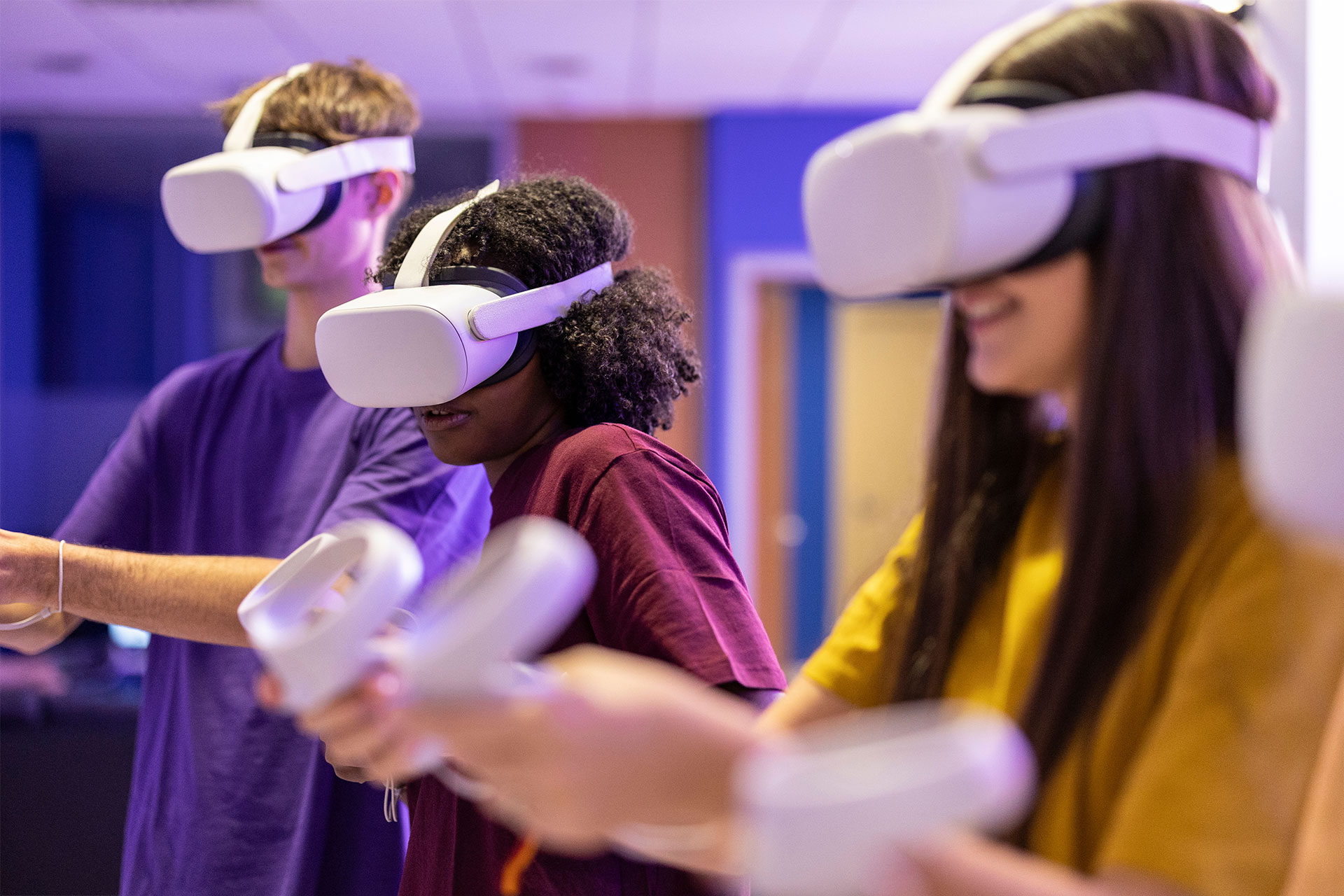
Summary
This page summarizes peer-reviewed evidence and teacher feedback of using Zoe Immersive in the classroom. Key highlights include:
- Enhanced engagement across subjects, fostering creativity, collaboration, critical thinking, and problem-solving.
- Increased student motivation, engagement, and attendance, creating a more enjoyable learning environment.
- Support for literacy development in English Language Arts (ELA) through creative and interactive storytelling.
- Improved understanding and performance in mathematics and science.
- Encouragement of higher-order thinking skills and real-world problem-solving.
- Effective customization for students with learning disabilities.
- Fostering of social cohesion and community among students.
- Development of computer science skills providing job-ready skills.
Introduction
Zoe Immersive leverages virtual reality (VR) to create engaging educational experiences. Students design and explore their own VR environments, enhancing learning across various subjects. This paper explores the benefits of integrating Zoe Immersive into classrooms, based on qualitative research and teacher feedback.
Zoe Immersive's flexibility allows for diverse educational applications, from science and technology to language arts and history. It enables students to create and manipulate virtual worlds, providing a dynamic learning environment. Data shows that Zoe Immersive improves engagement and educational outcomes.
Improving Motivation and Attendance
Zoe Immersive increases motivation by fulfilling students' needs for autonomy, competence, and relatedness (Ryan & Deci, 2000). Students can choose how to learn and what to create, master skills, and interact with peers, fostering intrinsic motivation (Pink, 2009). This leads to higher attendance and participation.
Students that I hadn't seen in a while started showing up to use Zoe
Enhancing Literacy and English Language Arts (ELA) Outcomes
High School Student explaining her Interactive Art project that participated into her getting into UCSD
Enhancing STEM Education Outcomes
Zoe Immersive facilitates STEM learning by helping students explore mathematical concepts, solve problems, and apply learning in authentic contexts. Teacher feedback indicates higher engagement and confidence in STEM subjects, with students demonstrating better understanding and performance through VR activities.
This is an example of a simple teacher-led science activity created with the Zoe App
Fostering Higher-Order Thinking Skills through PBL
Zoe Immersive promotes critical thinking, creativity, and collaboration. Students engage in project-based learning, designing VR environments and solving complex problems. Teacher testimonials show that VR projects enhance reasoning, justification, and reflection.
Students work on extended projects that explore real-world problems, apply interdisciplinary knowledge, and develop VR solutions. PBL in Zoe Immersive fosters active learning, collaboration, critical thinking, creativity, and real-world application, enhancing student motivation and engagement.
We recognize that project-based learning can be daunting to some teachers, this is why we have developed series of easy PBL lesson plans that will only take you one or two 40 minute classes to achieve.
For the more ambition teachers we have time for Capstone type projects with students, we provide resources and lessons to guide you with your planning:
Integrating Design Thinking Approaches
Experimentation and Innovation
Teachers showing their Zoe activities during our PD programs
Supporting Computer Science Education
Zoe Immersive develops computer science skills through the Zoe VR app and Unity Plugin. The beginner-friendly VR app introduces basic computer science concepts without coding, while the advanced Unity Plugin allows for an introduction to C# programming, providing hands-on experience with industry-standard tools and preparing students for technology careers.
Supporting Students with Learning Disabilities
Zoe Immersive benefits students with learning disabilities by providing a supportive and customizable environment. Feedback show significant improvements in academic performance and confidence for these students. The Zoe team is fully dedicated to improving the accessibility of the platform in collaboration with Special Ed educators.
Developing Digital Literacy and Technology Skills
Zoe Immersive enhances digital literacy and technology skills, essential for the 21st century. Students develop skills in searching, accessing, analyzing, and synthesizing information, and learn to communicate effectively using different digital media.
High School Student showing her Healthcare simulation created from scratch during a Capstone type project
Promoting Social Cohesion and Emotional Well-Being
Conclusion
Zoe Immersive offers diverse educational benefits, enhancing engagement, motivation, and learning outcomes across subjects. It supports the development of job-ready skills in computer science and digital literacy, preparing students for future educational and career opportunities.
References
This page summarizes peer-reviewed evidence and teacher feedback of Zoe Immersive, a platform enabling students to create VR experiences. Key highlights include:
- Ryan, R. M., & Deci, E. L. (2000). Self-determination theory and the facilitation of intrinsic motivation, social development, and well-being. American Psychologist, 55(1), 68-78.
- Pink, D. H. (2009). Drive: The Surprising Truth About What Motivates Us. Riverhead Books.
- Hasso Plattner Institute of Design at Stanford (d.school). (n.d.). An Introduction to Design Thinking.
- Additional videos, teacher testimonials supporting the educational benefits of Zoe Immersive.


